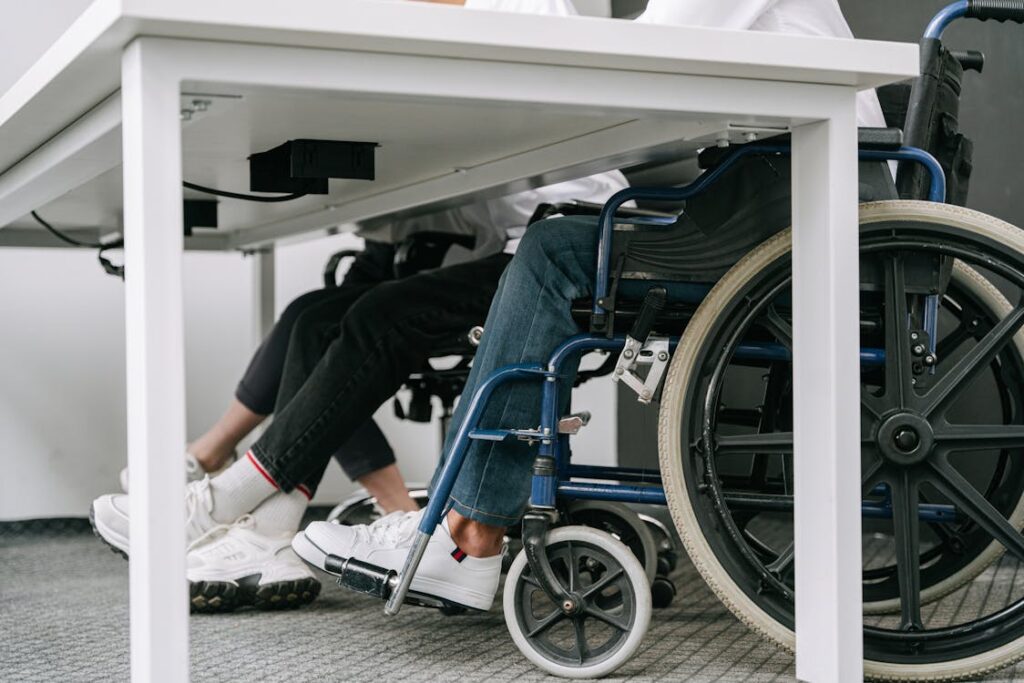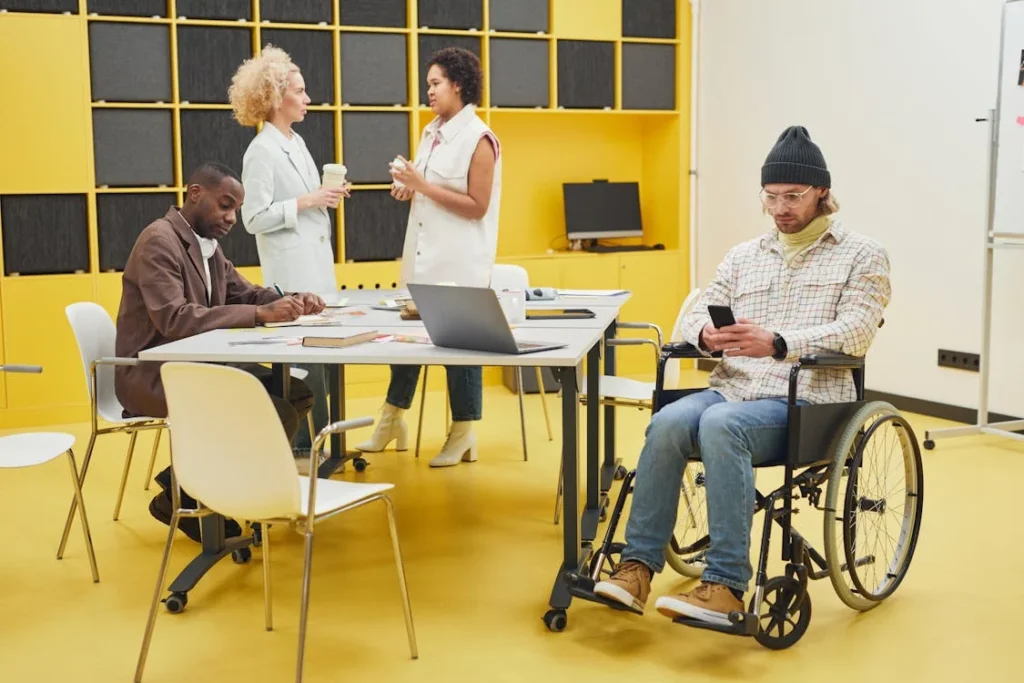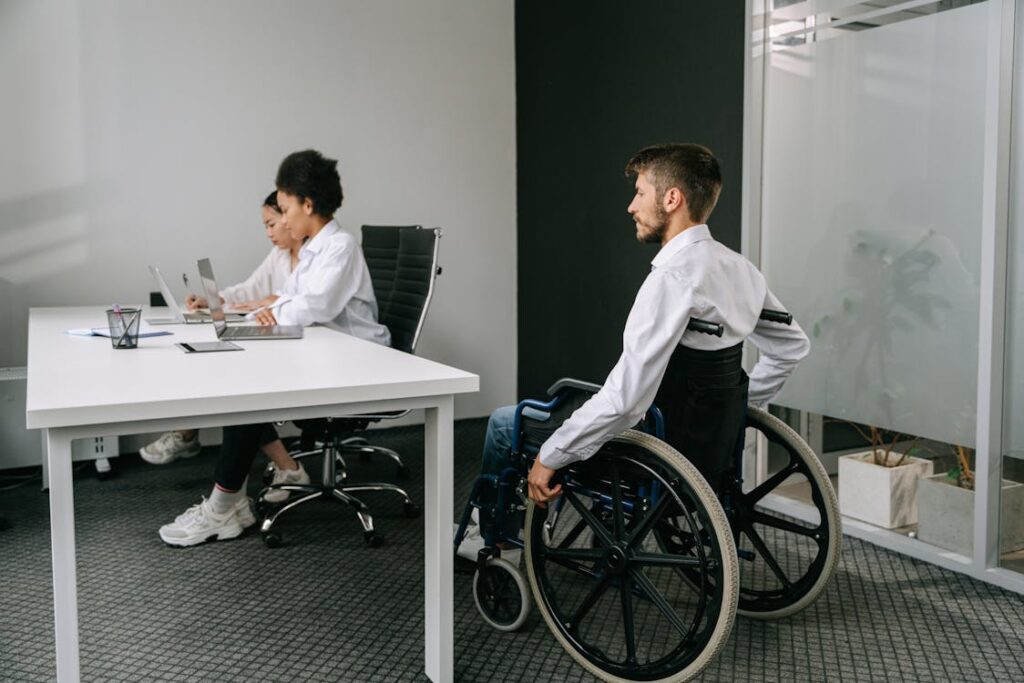India is on a path of rapid economic development, driven by innovation, entrepreneurship, and a growing workforce. Yet, a large section of the population—people with disabilities—remains underrepresented in the economy. Despite having immense talent and potential, millions of disabled individuals in India face barriers that prevent them from participating fully in the workforce.
Disability inclusion is not just a matter of social justice; it is also a key driver of economic growth. A truly thriving economy is one that leverages the skills and abilities of all its citizens, including those with disabilities. When businesses, policymakers, and society work together to create inclusive opportunities, it leads to higher employment rates, increased productivity, and a stronger economy.

Unlocking the Workforce Potential of People with Disabilities
India has a large population of people with disabilities—over 26 million, according to the Census 2011. However, their participation in the workforce remains low.
Many disabled individuals face challenges in accessing education, training, and employment opportunities. This lack of inclusion results in a significant loss of talent and productivity for the country.
When people with disabilities are given equal access to jobs, they contribute to economic growth in multiple ways. They bring diverse skills, perspectives, and problem-solving abilities that enhance workplace innovation and efficiency.
Many disabled individuals have developed exceptional adaptability, creativity, and resilience—traits that are valuable in any industry.
Businesses that hire people with disabilities also benefit financially. Studies show that companies with inclusive hiring policies tend to have lower employee turnover, higher productivity, and stronger customer loyalty.
When workplaces are accessible and welcoming, they attract a broader talent pool and create a more engaged workforce.
Government initiatives like the Rights of Persons with Disabilities Act, 2016, and the Accessible India Campaign aim to promote workplace accessibility and equal opportunities.
However, private sector involvement is equally important. Indian businesses must actively implement hiring programs, provide workplace accommodations, and create career development pathways for disabled employees.
Bridging the Education and Skill Gap
A major challenge in disability inclusion is the gap in education and skill development.
Many disabled individuals struggle to access quality education due to physical barriers, lack of assistive technology, and social stigma. This limits their ability to enter the workforce and build sustainable careers.
Investing in inclusive education and vocational training programs can help bridge this gap. Schools, colleges, and technical institutes must adopt accessible infrastructure and learning methods that cater to students with disabilities.
Digital learning platforms, AI-driven assistive tools, and government-backed scholarships can further expand educational opportunities.
Corporations can also play a role by offering internships, mentorship programs, and specialized training for disabled individuals. When companies invest in upskilling disabled workers, they not only create a diverse workforce but also strengthen their own talent pipeline.
The Economic Impact of Disability Inclusion in the Workplace
A workforce that includes people with disabilities is more productive and innovative. Research shows that diverse teams perform better because they bring different ways of thinking to problem-solving.
Disability inclusion encourages businesses to adopt new technologies, improve workplace design, and enhance team collaboration—all of which drive overall business growth.
Additionally, disabled employees often demonstrate high levels of loyalty and job satisfaction when given the right opportunities.
Companies that prioritize accessibility and inclusion reduce hiring costs by improving employee retention and minimizing turnover. This leads to long-term financial benefits and a more stable workforce.
Beyond individual businesses, disability inclusion has a broader impact on the national economy. When more disabled people are employed, household incomes rise, leading to increased consumer spending and market expansion.
An inclusive economy strengthens demand across industries, creating new business opportunities and economic stability.

Driving Innovation Through Disability Inclusion
Innovation thrives in environments where diverse perspectives come together. People with disabilities often develop unique ways to navigate challenges, leading to creative problem-solving skills that are highly valuable in the workplace.
When businesses embrace disability inclusion, they tap into this wellspring of innovation, resulting in new products, services, and processes that benefit not only disabled individuals but society as a whole.
The Role of Assistive Technology in Economic Growth
The demand for assistive technology is growing, creating opportunities for businesses to develop new solutions that enhance accessibility.
From advanced prosthetics and mobility aids to AI-powered communication tools, the assistive technology industry is a powerful driver of economic growth.
India has the potential to become a global leader in this sector by investing in research and development, supporting startups that focus on accessibility, and promoting local manufacturing of affordable assistive devices.
Companies like Robobionics, which develop innovative prosthetics, are already contributing to this vision by providing high-quality, cost-effective solutions that empower disabled individuals to live and work independently.
The more businesses invest in inclusive product design, the greater their market reach.
Many accessibility features originally designed for disabled users—such as voice assistants, touchless technology, and automated services—have become mainstream because they improve convenience for everyone.
By prioritizing universal design, companies can create products that cater to a larger consumer base while driving profitability.
Strengthening Key Industries with Disability Inclusion
Certain industries stand to gain significantly from disability inclusion. The manufacturing sector, for example, can benefit by implementing adaptive workstations that allow disabled employees to contribute to production processes.
Similarly, the IT industry can leverage remote work opportunities to include skilled disabled professionals in software development, digital marketing, and customer service roles.
India’s growing gig economy also presents new possibilities for disabled individuals. Platforms that offer freelance and remote work opportunities allow people with mobility challenges to participate in the workforce without facing transportation barriers.
By ensuring digital accessibility and inclusive hiring practices, gig economy companies can create economic opportunities for thousands of disabled workers.

Disability Inclusion as a Catalyst for Social and Economic Equality
A nation’s economic success is closely tied to its ability to provide equal opportunities for all citizens. Disability inclusion is not just about employment—it is about creating a fair society where every individual has the chance to contribute to and benefit from economic progress.
When disabled individuals are excluded from education, jobs, and public spaces, the economy loses out on untapped talent and potential.
Reducing Poverty Through Economic Empowerment
Exclusion from the workforce often leads to financial instability for people with disabilities. Many disabled individuals in India rely on family support or government assistance due to limited employment opportunities.
This dependency cycle not only affects individuals but also places additional financial strain on families and the economy.
By prioritizing inclusive employment, India can reduce poverty among disabled individuals and their families.
When disabled workers earn a stable income, they contribute to household financial security, invest in education, and participate in the economy as consumers. This leads to a positive economic ripple effect, increasing overall demand for goods and services.
Moreover, financial independence enhances the dignity and well-being of disabled individuals, allowing them to make choices about their lives and careers. Economic empowerment fosters confidence, self-sufficiency, and a stronger sense of belonging in society.
Expanding Market Opportunities Through Inclusion
Businesses that embrace disability inclusion not only gain skilled employees but also access a largely underserved consumer market.
The disabled community in India represents a significant segment of the population with specific needs for accessible products and services. Companies that cater to this market can unlock new revenue streams while promoting social good.
Industries such as retail, hospitality, and transportation stand to benefit from accessibility improvements.
When businesses offer inclusive services—such as wheelchair-friendly spaces, accessible payment systems, and disability-friendly customer support—they attract a broader customer base.
Investing in inclusive design is not just about compliance; it is a business strategy that leads to increased customer loyalty and brand reputation.

The Role of Government and Policy in Disability Inclusion
While businesses play a crucial role in promoting disability inclusion, government policies and initiatives are equally important in creating an ecosystem where disabled individuals can thrive.
Strong policy frameworks ensure that accessibility is not left to individual organizations but becomes a national priority, integrated into every sector of the economy.
Strengthening Legal Protections and Enforcement
India has made significant progress in disability rights with the Rights of Persons with Disabilities (RPwD) Act, 2016.
This law mandates equal opportunities in education, employment, and accessibility while increasing the number of recognized disabilities from seven to twenty-one. However, enforcement remains a challenge, and many businesses and institutions still fall short of full compliance.
To bridge this gap, the government must take stronger measures to ensure that businesses implement inclusive hiring practices, workplace accommodations, and digital accessibility.
Regular audits, financial incentives for accessible businesses, and penalties for non-compliance can drive real change. By making inclusion a business necessity rather than an option, India can create a more equitable workforce.
Investing in Accessible Infrastructure
For disabled individuals to participate fully in the economy, public spaces, transportation, and workplaces must be accessible.
The Accessible India Campaign (Sugamya Bharat Abhiyan) was launched to improve physical infrastructure, digital accessibility, and transportation systems for disabled individuals.
While progress has been made, there is still a long way to go in making cities, offices, and public transport truly inclusive.
Better infrastructure allows disabled individuals to travel independently, access employment opportunities, and contribute to society without unnecessary barriers.
Investments in ramps, elevators, accessible metro stations, and barrier-free office buildings are not just about compliance—they are investments in human capital and economic participation.
Encouraging Entrepreneurship Among Disabled Individuals
Self-employment and entrepreneurship provide valuable alternatives to traditional jobs, especially for disabled individuals facing workplace discrimination or accessibility barriers.
Government-backed financial aid, low-interest business loans, and skill development programs can empower disabled entrepreneurs to start their own businesses.
Initiatives like the National Handicapped Finance and Development Corporation (NHFDC) provide funding and support for disabled entrepreneurs, but awareness about these programs remains low.
By actively promoting these opportunities and streamlining application processes, the government can create a thriving network of disabled-led businesses that contribute to economic growth.

The Business Case for Disability Inclusion in India
While disability inclusion is often seen as a social responsibility, it is also a powerful economic strategy.
Companies that actively hire and support disabled employees gain access to a diverse talent pool, strengthen workplace culture, and improve their overall business performance.
In a competitive market like India, businesses that embrace inclusion can set themselves apart and drive long-term success.
Boosting Employee Productivity and Engagement
Research shows that inclusive workplaces lead to higher employee engagement and satisfaction. Employees perform better when they feel valued, respected, and supported, and this is true for both disabled and non-disabled workers.
An inclusive culture fosters collaboration, creativity, and loyalty—reducing employee turnover and increasing overall productivity.
When companies provide workplace accommodations such as assistive technology, flexible schedules, and accessible office spaces, employees with disabilities can perform at their highest potential.
These accommodations often benefit the entire workforce, leading to a more efficient and adaptable work environment.
Enhancing Corporate Reputation and Consumer Trust
Consumers today are more socially conscious and prefer to support businesses that prioritize inclusion and ethical practices.
Companies that hire disabled employees, ensure accessible services, and promote disability-friendly initiatives enhance their brand reputation. This builds consumer trust and strengthens relationships with customers who appreciate corporate social responsibility.
Businesses that visibly support disability inclusion also attract top talent. Many skilled professionals prefer working for companies with strong diversity and inclusion policies, making it easier for businesses to recruit and retain highly qualified employees.
Expanding Market Reach Through Accessibility
Inclusive businesses do not just benefit from a more diverse workforce—they also tap into a growing consumer market. People with disabilities and their families represent a significant portion of the population, and businesses that cater to their needs gain a competitive edge.
For example, accessible banking services, e-commerce platforms with screen-reader-friendly interfaces, and restaurants with wheelchair-friendly spaces appeal to a wider customer base.
Making products and services accessible not only ensures compliance with disability laws but also opens up new revenue opportunities.
Attracting Investment and Global Partnerships
Disability inclusion is becoming a key factor in corporate governance and investment decisions. Many global investors and multinational companies prefer working with organizations that align with diversity, equity, and inclusion (DEI) values.
Companies that prioritize accessibility can attract foreign direct investment (FDI), build international partnerships, and expand into global markets where inclusivity is a major business priority.
By positioning themselves as leaders in disability inclusion, Indian businesses can enhance their global competitiveness.

The Role of Technology in Advancing Disability Inclusion
Technology has the power to bridge many of the barriers that prevent people with disabilities from fully participating in the workforce and economy.
As India embraces digital transformation, businesses and policymakers must ensure that technological advancements are designed with accessibility in mind.
When technology is inclusive, it empowers disabled individuals to contribute their skills and talents without unnecessary limitations.
Assistive Technology for Workplace Inclusion
The development of assistive technology has revolutionized how disabled individuals engage with the world. Innovations such as speech-to-text software, AI-powered screen readers, and adaptive input devices allow people with disabilities to work efficiently in various industries.
For individuals with mobility impairments, robotic exoskeletons and advanced prosthetics—such as Robobionics’ Grippy™—help restore movement and functionality, allowing them to take on roles that were previously challenging.
Businesses that integrate these technologies into their workplace ensure that disabled employees can perform tasks comfortably and productively.
Employers should also invest in digital accessibility tools to make workplace systems more inclusive.
Simple adjustments, such as offering alternative input methods, ensuring compatibility with screen readers, and enabling voice commands, can make a significant difference in creating a disability-friendly work environment.
Remote Work as an Inclusive Employment Strategy
The shift toward remote and hybrid work has created new opportunities for disabled individuals. Many people with disabilities face challenges with daily commuting due to inaccessible transportation or physical fatigue.
Remote work allows them to contribute to the workforce without these added difficulties.
Indian companies that adopt flexible work policies make employment more accessible to disabled individuals.
Offering remote job roles, providing home office accommodations, and using digital collaboration tools ensure that employees with disabilities can work comfortably from any location.
Digital Accessibility and the Future of E-Commerce
As India moves toward a digital economy, ensuring online accessibility is crucial. Websites, apps, and e-commerce platforms should be designed with disabled users in mind.
Many Indian businesses still fail to meet basic accessibility standards, making it difficult for people with disabilities to access digital services.
A more inclusive digital space benefits businesses by expanding their customer base.
When e-commerce platforms integrate accessibility features—such as keyboard navigation, voice commands, and alternative text descriptions—they become usable for millions of potential consumers with disabilities.

Building a Culture of Disability Inclusion in India
While policies, technology, and business strategies play a vital role in promoting disability inclusion, cultural attitudes are equally important. A truly inclusive economy is built on a foundation of respect, acceptance, and proactive efforts to remove social barriers.
Changing the way society views disability is essential to ensuring that people with disabilities are fully integrated into the workforce and economic growth of India.
Challenging Stereotypes and Misconceptions
One of the biggest obstacles to disability inclusion is the social stigma that surrounds disability in India. Many people still hold outdated beliefs that individuals with disabilities are dependent or incapable of contributing meaningfully to the workforce.
These misconceptions discourage employers from hiring disabled individuals and limit opportunities for career advancement.
Educational campaigns, media representation, and public discussions can help change these narratives. When society sees disabled individuals succeeding in business, politics, sports, and technology, it challenges stereotypes and shifts perceptions.
Employers who actively promote success stories of disabled employees help create a more inclusive mindset in the workplace.
Encouraging Inclusive Education from an Early Age
Disability inclusion must begin in schools and universities. When children grow up in an environment where disability is normalized and respected, they are more likely to become inclusive employers, colleagues, and policymakers in the future.
Inclusive education ensures that disabled students receive the same opportunities as their peers. Schools must adopt accessible infrastructure, provide assistive learning tools, and train teachers to support students with diverse needs.
Universities should also implement disability-friendly admission policies and campus accommodations to ensure equal access to higher education.
When disabled individuals receive quality education, they are better prepared for the workforce, and the economy benefits from a highly skilled and diverse talent pool.
Strengthening Disability Advocacy and Leadership
For true inclusion to take place, people with disabilities must have a voice in decision-making. Whether in government, corporate leadership, or entrepreneurship, disabled individuals should be part of shaping policies and strategies that impact them.
Encouraging disabled leaders to take on advisory roles, participate in policy discussions, and represent disability inclusion in public forums creates systemic change. Businesses and government institutions should actively seek input from disability rights organizations,
Employee Resource Groups (ERGs), and disabled professionals to ensure their initiatives are truly inclusive.
When disabled individuals are seen as leaders, it empowers others in the community to pursue ambitious career paths and strengthens the overall economy.
Conclusion
Disability inclusion is not just a moral responsibility—it is a key driver of India’s economic growth. By integrating people with disabilities into the workforce, businesses gain access to untapped talent, increase innovation, and expand market opportunities. An inclusive economy strengthens financial independence for disabled individuals, reduces poverty, and boosts overall productivity.
For true progress, India must go beyond legal mandates and actively invest in accessible education, workplace accommodations, and assistive technology. Companies that embrace disability inclusion improve employee engagement, attract socially conscious consumers, and enhance their global competitiveness. Governments, businesses, and society must work together to break down barriers and foster an environment where all individuals can thrive.
The future of India’s economy depends on harnessing the potential of every citizen. By making inclusion a core part of national development, India can build a stronger, more resilient economy—one where opportunity is available to everyone, regardless of ability.



